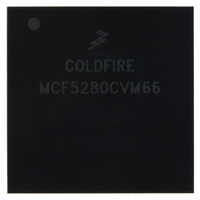MCF5280CVM66 Freescale Semiconductor, MCF5280CVM66 Datasheet - Page 160

MCF5280CVM66
Manufacturer Part Number
MCF5280CVM66
Description
IC MPU 32BIT COLDF 256-MAPBGA
Manufacturer
Freescale Semiconductor
Series
MCF528xr
Datasheet
1.MCF5216CVM66J.pdf
(766 pages)
Specifications of MCF5280CVM66
Core Processor
Coldfire V2
Core Size
32-Bit
Speed
66MHz
Connectivity
CAN, EBI/EMI, Ethernet, I²C, SPI, UART/USART
Peripherals
DMA, LVD, POR, PWM, WDT
Number Of I /o
142
Program Memory Type
ROMless
Ram Size
64K x 8
Voltage - Supply (vcc/vdd)
2.7 V ~ 3.6 V
Data Converters
A/D 8x10b
Oscillator Type
External
Operating Temperature
-40°C ~ 85°C
Package / Case
256-MAPBGA
Controller Family/series
ColdFire
No. Of I/o's
150
Program Memory Size
2KB
Ram Memory Size
64KB
Cpu Speed
66.67MHz
Embedded Interface Type
CAN, I2C, SPI, UART
No. Of Pwm Channels
8
Rohs Compliant
Yes
Lead Free Status / RoHS Status
Lead free / RoHS Compliant
Eeprom Size
-
Program Memory Size
-
Available stocks
Company
Part Number
Manufacturer
Quantity
Price
Company:
Part Number:
MCF5280CVM66
Manufacturer:
FREESCAL
Quantity:
151
Company:
Part Number:
MCF5280CVM66
Manufacturer:
Freescale Semiconductor
Quantity:
10 000
Company:
Part Number:
MCF5280CVM66J
Manufacturer:
Freescale Semiconductor
Quantity:
10 000
Company:
Part Number:
MCF5280CVM66L
Manufacturer:
FREESCAL
Quantity:
151
- Current page: 160 of 766
- Download datasheet (9Mb)
System Control Module (SCM)
8.5.1
The basic functionality is that of a 4-port, pipelined internal bus arbitration module with the following
attributes:
8-8
•
•
•
•
•
•
The master pointed to by the current arbitration pointer may get on the bus with zero latency if the
address phase is available. All other requesters face at least a one cycle arbitration pipeline delay
in order to meet bus timing constraints on address phase hold.
If a requester will get an immediate address phase (that is, it is pointed to by the current arbitration
pointer and the bus address phase is available), it will be the current bus master and is ignored by
arbitration. All remaining requesting ports are evaluated by the arbitration algorithm to determine
the next-state arbitration pointer.
There are two arbitration algorithms, fixed and round-robin. Fixed arbitration sets the next-state
arbitration pointer to the highest priority requester. Round-robin arbitration sets the next-state
arbitration pointer to the highest priority requester (calculated by adding a requester's fixed priority
to the current bus master’s fixed priority and then taking this sum modulo the number of possible
bus masters).
The default priority is FEC (M3) > DMA (M2) > internal master (M1) > CPU (M0), where M3 is
the highest and M0 the lowest priority. M3 is not used for the MCF5216 and MCF5214.
There are two actions for an idle arbitration cycle, either leave the current arbitration pointer as is
or set it to the lowest priority requester.
The anti-lock-out logic for the fixed priority scheme forces the arbitration algorithm to round-robin
if any requester has been held for longer than a specified cycle count.
Overview
MCF5282 and MCF5216 ColdFire Microcontroller User’s Manual, Rev. 3
*Not used on
MCF5214/16
Internal
Master
DMA
CPU
FEC
Bus
M3
SRAM1
M0
M2
M1
Figure 8-6. Arbiter Module Functions
“back door” to SRAM and Flash
MARB
MPARK
SDRAMC
Modules
Internal
EIM
RAMBAR
Freescale Semiconductor
Related parts for MCF5280CVM66
Image
Part Number
Description
Manufacturer
Datasheet
Request
R
Part Number:
Description:
Manufacturer:
Freescale Semiconductor, Inc
Datasheet:
Part Number:
Description:
Manufacturer:
Freescale Semiconductor, Inc
Datasheet:
Part Number:
Description:
Manufacturer:
Freescale Semiconductor, Inc
Datasheet:
Part Number:
Description:
Manufacturer:
Freescale Semiconductor, Inc
Datasheet:
Part Number:
Description:
Manufacturer:
Freescale Semiconductor, Inc
Datasheet:
Part Number:
Description:
Manufacturer:
Freescale Semiconductor, Inc
Datasheet:
Part Number:
Description:
Manufacturer:
Freescale Semiconductor, Inc
Datasheet:
Part Number:
Description:
Manufacturer:
Freescale Semiconductor, Inc
Datasheet:
Part Number:
Description:
Manufacturer:
Freescale Semiconductor, Inc
Datasheet:
Part Number:
Description:
Manufacturer:
Freescale Semiconductor, Inc
Datasheet:
Part Number:
Description:
Manufacturer:
Freescale Semiconductor, Inc
Datasheet:
Part Number:
Description:
Manufacturer:
Freescale Semiconductor, Inc
Datasheet:
Part Number:
Description:
Manufacturer:
Freescale Semiconductor, Inc
Datasheet:
Part Number:
Description:
Manufacturer:
Freescale Semiconductor, Inc
Datasheet:
Part Number:
Description:
Manufacturer:
Freescale Semiconductor, Inc
Datasheet:











